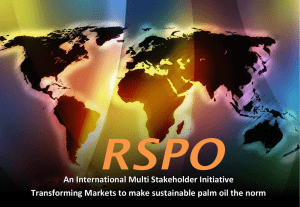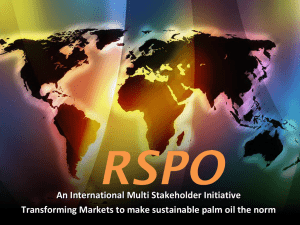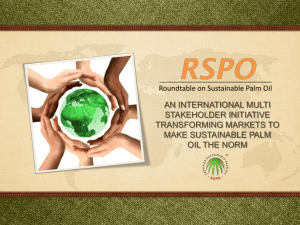02_M2a SCCS The Standard Part1_May2013
advertisement
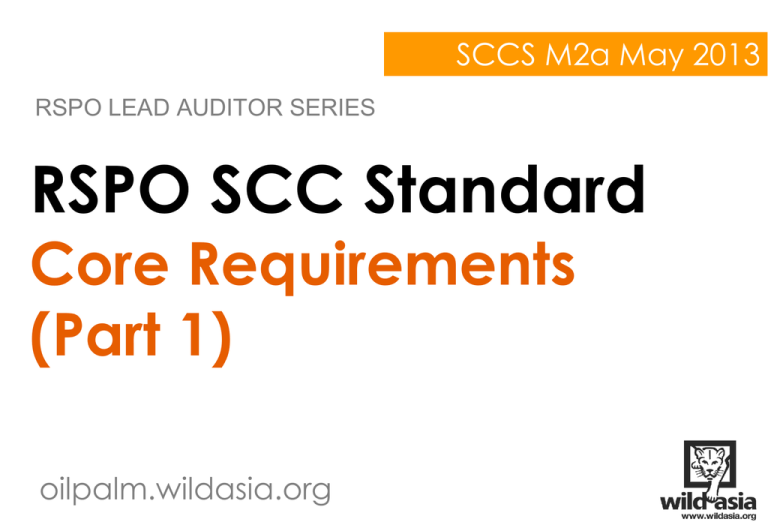
SCCS M2a May 2013 RSPO LEAD AUDITOR SERIES RSPO SCC Standard Core Requirements (Part 1) oilpalm.wildasia.org Control of Certified Palm Oil products in Supply Chain RSPO Supply Chain Certification Standard 1. CERTIFICATION OVERVIEW 2. BOOK & CLAIM a. Overview & Guidelines 2011 3. GENERAL REQURIEMENTS a. General for all facilities (inc. CPO mills) 4. MODULAR REQUIREMENTS a. SG and b. MB SCC Standard 1. Certification Overview SCS Objective To physically manage sustainable palm oil products; or specifically administrate all purchases and sales of certified products 6 SCS Coverage Trade of batches of crude palm oil (CPO) or palm kernal oil (PKO) and its derivatives, products 6 Unit of Certification “All operators who take legal ownership & physically handle (including receipt into storage tanks) RSPO certified sustainable oil palm products” This applies up and including the end product manufacturer: – First operator: Palm Oil Mill (BC, SG or MB only) – Last Operator: End Product Manufacturer Facility or parent company are RSPO members RSPO member Trademark & claims controlled by RSPO rules RSPO member CPO mill SC during P&C audit CPO Mill adopts SG/MB models RSPO member SCCS certifies individual facilities Non-conformances • All non-conformances are considered Major • Where non-conformances are not closed out within (3) months of the audit, a full re-audit is required For NC after certification…1 month to close. Awarding Certification CB submits to RSPO and updates E-trace RSPO to upload certificate on RSPO website and E-trace system within 1 working week SCC Standard 2. Book & Claim Objective To broker direct payments between supporters of sustainable palm oil and CSPO producers 6 Physical trade of palm oil products continues … CPO Mill is RSPO Certified Adopts Book & Claim as its SCCS certification model Certified CPO (PKO) registered into Greenpalm Web Database Greenpalm Trademark is only used in any market claims Green Palm member purchases GP certificates from CPO Mill General Requirements • Must be a member of Greenpalm • Only RSPO certified producers can sell certificates (growers or smallholders) • Supporters/End users can buy certificates and claim to support sustainable palm oil. Rules governed by RSPO/Greenpalm • Sales transacted directly or off-market. Buyers • • • • 1 GP certificate is equivalent to1 mt CPO Sales no less than 25 GP certificates Buyers cannot resell certificates Greenpalm logo and claims must be approved before use • Olechemical derivatives, commonly used by home care products, are guided by conversions determined by the 2012 RSPO Rules for Home and Personal Care Derivatives. SCC Standard 3. General Requirements General Requirements Consist of the following elements; 5.2 Documented procedures 5.3 Purchasing and goods in 5.4 Outsourcing activities 5.5 Sales & goods out 5.6 Registration 5.7 Training 5.8 Claims • Procedures for Implementation • Records and reports to demonstrate compliance • Person-in-charge named & demonstrate awareness of facility procedures 5.2 Documented Procedures • Documentation purchases from suppliers indicate IP/MB/MB • E.g., purchase orders, contracts, material specifications • Checks by facility • RSPO certified in origin • SCC Certificates Valid • Confirmation of trade (e.g., Shipping Announcement and Shipping Confirmations in e-Trace) • Mechanism/procedures for handling non-conformity material/documents. 5.3 Purchasing and goods in • Third-parties can be included in Facility's SCC certification. (e.g., subcontractors for storage, transport) • IF: • Maintains legal ownership • Enforced agreement facility-third parties (allow unrestricted access of CBs) • Documented control procedures • Facility maintains names/contact details of all contractors and inform CB of any updates 5.4 Outsourcing activities • Sales invoices or relevant documents (e.g. delivery notes, shipping documents, etc) includes sufficient information on RSPO certified palm oil products delivered. • Names/Contacts of buyer or seller • Loading/delivery date • Certified product description (IP/MB/SG) • Quantities delivered • Transportation information • SCCS Certificate Reference Number 5.5 Sales of Goods Out • Registration in RSPO IT System: • Legal/physical ownership of certified product • All supply chain actors, up to final refinery • MUST • CPO and PKO Mills • Refineries (note: final refinery confirms receipt of shipments only) • EXCLUDES • Traders but not handling physical material (traceability number must be included in shipment documentation) • Operators after final refinery (retailers/end product manufacturer) 5.6 Registration • Defined training plan for implementation of the SCCS requirements. • Training to all staff to implement the SCCS requirements. • Training plan subject to review and updates. • Maintain relevant training records. 5.7 Training • Facility shall only make claims regarding use or support of CSPO in compliance with RSPO Rules for Market Claims. 5.8 Claims Outsourcing services covered by facility certification Defined Person-in-Charge for SCCS Certificate Number indicated on outgoing documents Facility checks validity of RSPO Certificates delivered E-Trace updated when RSPO product delivered by CPO mill or arrives at final manufacturer SCC Standard 4. Modular Requirements Modular Requirements • Facility must comply with General Requirements and at least one of the modules. • Several modules can be implemented simultaneously. • CPO Mills must apply either SG or MB • Modules: • • • • • • • A Identity Preserved B Segregation C Mass Balance D CPO Mills (Segregation) E CPO Mills (MB) F Multi Site Certification G Group Scheme NEW 2013 Covered in this section SEGREGATION A/B – IP & SG Segregation ensures receipt, processing and storage maintains RSPO products is physically separated Source of Certified Material is identified Outgoing documentation identifies Certified product Product has minimum 95% RSPO certified product • Follows same or less strict model of supplier (IP > SG > MB > Uncertified) Processing • 100-95% of source is identifiable to: • (a) a single mill and supply base (IP) • (b) certified segregated material (SG) • Demonstrate (inc. procedures & record keeping) segregation: • Prevents physical mixing (isolated) • Transport and Storage (note: handling non conformities or diversion of new crop to mill due to mill shutdowns) Processing 95% rule • Objective is for 100% CSPO product • Allows for minor contamination up to 5% • Residual oils/products in storage tanks, transport facilities • Tanks/pipes/valves need to have procedures to handle different SCCS systems (SG vs MB) • Records and reports for at least 5 years • Documented proof that supply is traceable: • (a) IP: to a single palm oil mill and supply • (b) SG: certified segregated material • Trade names shall be indicated on relevant documents (e.g., purchase and sales contracts): • [Product Name]/IP or Identity Preserved • [Product Name]/IP or Segreagated Record Keeping SG Suppy Chain Yield Scheme CPO 100 % 1,000 mt PFAD 5% 50 mt Refined Palm 94 % 940 mt OLEIN 80 % 752 mt Double Frac Olein (Super Olein) 65 % 489 mt Estimated only (+/- 2%) Losses 1% 10 mt STEARIN 20 % 188 mt Palm Mid Fraction 35 % 263 mt Palm Mid Stearin 65 % 122 mt Double Frac Stearin 35 % 66 mt MASS BALANCE C - MB Mixed sources of FFB (certified and noncertified) MB products are purchased MB Yield Scheme used to determine how much MB products can be sold Facility maintains an account of volume of certified material received and processed Product has minimum 95% RSPO certified product • Follows same or less strict model of supplier (IP > SG > MB > Uncertified) Processing • Records and reports for at least 5 years. • Trade names shall be indicated on relevant documents (e.g., purchase and sales contracts): • [Product Name]/MB or Mass Balance Record Keeping • Quantity of physical RSPO mass balance material inputs and outputs (volume or weight) at the physical site are monitored on a real-time basis. • Accounting of material ensures: • Delivery of MB sales from positive stock • Allows for short selling (sales ahead of actual receipt) • MB volume starts from date it enters the accounting system and is deducted when it is allocated to outputs supplied by the organisation. • MB claims on outputs matches inputs as per yield scheme. Mass Balancing System MB Suppy Chain Yield Scheme • SG palm and palm kernel products can be used to support a MB claim, without a physical/chemical link between the SG product and the derivative sold as MB. • However…SG palm oil products cannot be used to offset mass balance claims on palm kernel products or vice versa. Mass Balancing Scheme Palm Kernel MB Yield Scheme 100 mt palm kernels 45 mt palm kernel oil 15.8 mt PKO stearin + 29.2 mt PKO olein Companies that purchase segregated palm kernel products can either: • Apply segregated claim to all subsequent derivatives …..OR • Use it to offset sales of equal volumes of MB palm kernel derivatives(not necessarily derived from the segregated product acquired) PK Mass Balancing Scheme PK MB/SG Yield Scheme Model Yield Scheme MB 100 mt PK --> 45 mt PKO --> 15.8 mt PKO Stearin + 29.2 PKO Olein SG-a Apply segregated claim to all derivatives SG-b Offset equal volumes of MB PK-derivatives with SG PK-products Example: Harmonisation Refinery receives an order for 1,600 mt of CSPO MB Olein. 2,000 mt RBDPO is required to produce 1,6000 mt of Oleine. It has in the RSPO account 5,000 mt MB CPO and 3,000 mt CPO in physical stock. Following should occur: 1. Physical stock is refined to produce 1,600 mt MB Oleine. 2. 2,000 mt is deducted from the RSPO account 3. 400 mt of Stearin is added to the RSPO account. Sales can be affected anytime in the future Example: Harmonisation Refinery purchases 1,000 mt of Refinery purchases 1,000 mt of MB PK. CSPO MB. Options for sales: Options for sales: 1. MB 450 mt PKO; or 1. MB 1,000 mt Refined Palm Oil 2. MB 158 mt PKO Stearin and 292 mt (RBDPO); or PKO Olein 2. MB 800 mt Oleine and MB 200 mt Stearin; or 3. MB 520 mt Double Frac Olein or 280 mt Palm Mid Fraction etc PFAD, offset MB with equal volumes of SG products All other derivatives, offset MB with equal volumes of SG products Example: Combined 1. 50 mt of SG + 10 mt of MB = 60 mt MB 2. 10 mt of non CSPO + 10 mt of SG = 10 mt MB 3. 10 mt of MB + 13 mt MB = 23 mt MB 4. 20 mt of MB + 10 mt of non CSPO = 20 mt of MB Example: Substitution 1. 1,000 mt SG/IP CPO = 1,000 mt MB of any fractions 2. 1,000 mt SG/IP PKO = 1,000 mt MB of any fractions (e.g., PFAD, etc) BUT cannot buy SG CPO for MB PK fractions or vice versa SCC Standard Conclusion Conclusion • The SCCS certificate covers all operators who legally own or physically handle RSPO certified products. • SCCS requirements focus on handling, accounting and communication of use of certified products. • Three supply chain models are covered: • Book & Claim • Segregated and Identity Preserve • Mass Balance Questions? E: advisory@wildasia.org W: oilpalm.wildasia.org
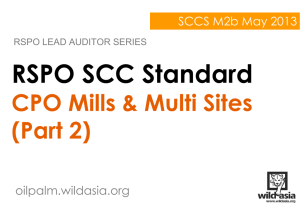
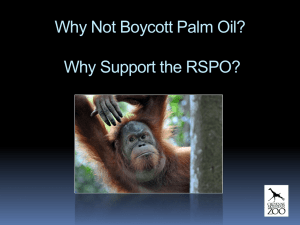
![Senior Supplier: [S Murphy]](http://s2.studylib.net/store/data/005470081_1-e104ea2fd5e2b6661eb586c19f7a89ca-300x300.png)
